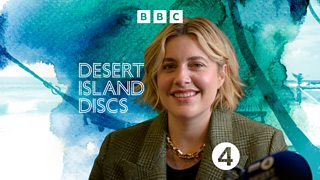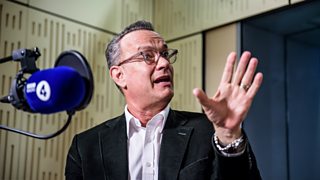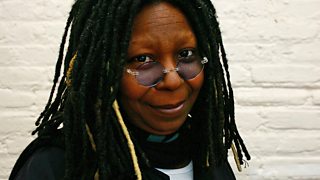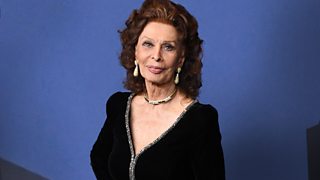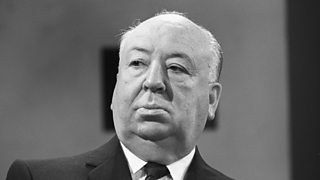Seven things we learned from Greta Gerwig's Desert Island Discs
This year Greta Gerwig made cinematic history: after the release of Barbie, she became the first woman to have the sole director’s credit for a billion dollar box-office blockbuster.
She started out acting in and co-writing independent films, and first made her name as a director with Lady Bird in 2017. Her version of Little Women was nominated for six Academy Awards in 2020, including Best Picture and Best Adapted Screenplay, and Barbie is tipped to be a strong contender in the forthcoming awards season.
Here's what we learned from Greta’s Desert Island Discs...
-
![]()
Listen to Greta Gerwig's Desert Island Discs
To hear full episodes with the full tracks first listen on 91热爆 Sounds.

1. Greta wanted to be a dancer – but ended up enjoying great sporting success
When she was young Greta says she had “intense loves and passions.”
I think I had a sort of force of will that made people just sort of go with it in some way. I couldn't think of anything more that I wanted to do than organise fantasy plays
“I wanted to be a dancer. I had studied ballet, I would have spent seven days a week there for as long as I could have done it,” says Greta. “My mom was worried… I would get too obsessive about things.”
Ballet didn’t work out, so her mother soon found a different outlet for Greta’s energy: “Because I was intense and because I had all this kind of drive, I think sports were a very good place for me to put that, because there's a real structure in sports that allows for that. And [there] my competitiveness was fine.”
Greta took up fencing, and – thanks to her drive and commitment – she ended up ranking third in California and eighth in the USA for her age-group, winning numerous trophies on the way.
2. The urge to direct came at a very young age
“I was trying to organise other kids into re-enacting plays I'd seen,” Greta says.
And after seeing Andrew Lloyd Webber’s musical Starlight Express, in which Rusty the steam locomotive competes against newer engines, with performers on roller skates, a very young Greta decided to create her own version:
“I remember - I must have been in kindergarten - explaining to all the kids what the story of Starlight Express was, and that I would be playing Rusty and I was like, ‘No, no, we're all trains and we're being played with. And we are the steam engines but they're these electric trains that are coming...’ and they said, ‘What are you talking about?’ And I was like, ‘... and we're all on roller skates, but I know we're not, so we're all going to have to pretend to be.”
“I think I had a sort of force of will that made people just sort of go with it in some way. I couldn't think of anything more that I wanted to do than organise fantasy plays.”
3. As a child Greta was denied her own Barbie doll
“Yeah, my mom wasn't so into Barbie... Certain moms would be like, ‘I don't know if this is a good example of womanhood or, body type and everything,’” recollects Greta.
“She was less excited about that, but I got hand-me-downs from girls in the neighbourhood where I was growing up and so I got a lot of pre-loved dolls. Although my mom, I will give her credit, she did give me a doll, a proper doll for Christmas. She relented and then I destroyed her.”

4. An act of kindness shown to Greta in 7th grade became a formative moment
“It was the first time I changed classes and there were all these people and lockers and I felt intimidated,” Greta recalls. “Anyway, we were taking a maths test, and I had to go to the bathroom. And then… one of those awful moments: I had peed my pants in 7th grade during a maths test.”
This sounds wild, but I truly think if David Bowie hadn't existed, I wouldn't have made anything
It's a painful memory, but with an unexpected twist:
“The thing that happened, which was actually so lovely, was a girl across from me, saw what was happening - I started crying. Even telling it now, I just feel so sad - and I was ashamed. And she had a sweatshirt and she took it off and she gestured, wrap it around yourself so no one sees. She gave me her sweatshirt and then I ran out of the room.”
The following year, Greta had to write a personal essay, and described this experience, assuming her story would only be read by her teacher – but the teacher decided to pin the story on the noticeboard for the class to see.
“Then everybody knew that it happened to me,” Greta says – and although she still found the memory embarrassing, she discovered that she could turn writing about her own experience into something others would want to read.
5. She was obsessed by a David Bowie lyric – and he became a vital influence
Greta’s fifth choice of disc for her desert island is Moonage Daydream, from David Bowie’s 1972 Ziggy Stardust album.
"For some reason, David Bowie wasn't actually in the record collection [at home], so I didn't hear David Bowie until I was in college. I was 18 [and] it tripped some wire in me.”
“And that lyric [from Moonage Daydream]: ‘Keep your electric eye on me’. I didn't know what it meant, but it felt like, ‘What is this?’ And I wrote it on everything. All my notebooks, textbooks, anything I would write: ‘Keep your electric eye on me’. It had a weight.”
“This sounds wild, but I truly think if David Bowie hadn't existed, I wouldn't have made anything,” says Greta.
6. Greta and her partner Noah Baumbach were Oscar rivals
Both Greta and Noah are directors and screenwriters. They wrote the script for Barbie together and had previously co-written Frances Ha, a 2012 comedy drama that Noah directed and Greta starred in.
In 2020, Greta’s film Little Women was nominated for six Academy Awards while Noah’s Marriage Story also received six nominations – and their films were both contenders in the Best Picture category.
It could have been a divisive moment in their household, but Greta says it was very positive: “There was a celebration of both of the things we were making and that was amazing.”
So what happened when it came to the hard reality of Oscar decision-making? “We voted for ourselves,” Greta laughs. “We did check in with each other!”
7. She thinks her final disc is an ideal choice for a desert island
Greta’s eighth disc is Ain't Got No, I Got Life, recorded in 1968 by Nina Simone, with its exuberant chorus which begins ‘Got my hair, got my head, got my brains, got my ears…’.
Greta says she’s attracted to voices, and loves the combination of pain and joy Nina Simone offers when she sings: “And I also thought, given that I'm on a desert island, this [song] is a sort of celebration of what you have - and not what's missing!”
In recent years, Nina Simone has become a very popular choice among the castaways on Desert Island Discs: others to choose her include Adele, John Legend, Thom Yorke and Kirsty Young.

